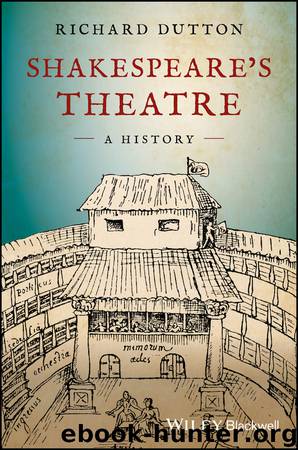Shakespeare's Theatre by Richard Dutton

Author:Richard Dutton
Language: eng
Format: epub
ISBN: 9781118939321
Publisher: Wiley
Published: 2018-03-12T00:00:00+00:00
Musicians
The King’s Revels list of charges of the house includes “music,” while (as we shall see) in the 1624 list of “necessary attendants” to the King’s Men musicians are the only category specifically named (p. 301ff). The Blackfriars theatre had its famous consort of musicians and they are presumably what Sir Henry Herbert had primarily in mind when he drew up that list, making musicians so prominent. But music was an essential element of all professional drama in the period; and every leading troupe employed professional musicians (doubtless in smaller numbers than the Blackfriars) to provide it. They fell into at least two categories. On the one hand there were those who played the drums and trumpets; on the other there were those who would play chamber music or accompany songs, playing woodwind or stringed instruments. Such sets of instruments would not have been expected to perform together at this date.
Drums and trumpets had a very specific role outside the playhouse: in announcing the arrival of traveling players at a new venue and in making people aware that a show was about to begin at one of the London theatres. Hence they figure prominently in the anti‐theatrical literature. For example John Stockwood, in a 1578 sermon preached at Paul’s Cross, bewailed “Will not a filthy play, with the blast of a trumpet, sooner call thither a thousand, than an hour’s tolling of a bell bring to the sermon a hundred?” (ES, 4: 199). It was a point often made. And when the Lord Mayor in 1580 wrote to the Earl of Warwick about his players appearing in venues near the city, he is careful to spell out that if their leader “obtain lawfully to play at the Theatre or any other open place out of the City, he hath and shall have my permission with his company, drums, and show to pass openly through the City, being not upon the Sunday” (291). The Lord Mayor remains respectful, but he stands his ground: they must get proper permission, they mustn’t perform on Sundays. In such a context allowing the use of drums at all is a gracious concession. When James Burbage was building the second Blackfriars theatre, however, it was part of the (successful) objection of the local residents “that the same playhouse is so near the church that the noise of the drums and trumpets will greatly disturb and hinder both the ministers and parishioners in time of divine service and sermons” (320). And when Lord Hunsdon negotiated with the Lord Mayor to allow his new company to use the Cross Keys inn during the winter of 1594/5, he made the very specific concession that they “will not use any drums or trumpets at all for the calling of people together” (316).
Nevertheless, there would always be work for drummers and trumpeters within performances themselves, since between them they provided the musical soundtracks of warfare and royal ceremony. In Act 4 of Richard III a stage direction reads “Enter King Richard and his train, marching with drums and trumpets” (Q1 1597, 4.
Download
This site does not store any files on its server. We only index and link to content provided by other sites. Please contact the content providers to delete copyright contents if any and email us, we'll remove relevant links or contents immediately.
Aircraft Design of WWII: A Sketchbook by Lockheed Aircraft Corporation(32187)
The Great Music City by Andrea Baker(31245)
Call Me by Your Name by André Aciman(20347)
The Secret History by Donna Tartt(18802)
The Art of Boudoir Photography: How to Create Stunning Photographs of Women by Christa Meola(18500)
Shoot Sexy by Ryan Armbrust(17633)
Plagued by Fire by Paul Hendrickson(17313)
Portrait Mastery in Black & White: Learn the Signature Style of a Legendary Photographer by Tim Kelly(16931)
Adobe Camera Raw For Digital Photographers Only by Rob Sheppard(16880)
Photographically Speaking: A Deeper Look at Creating Stronger Images (Eva Spring's Library) by David duChemin(16595)
Ready Player One by Cline Ernest(14486)
Pimp by Iceberg Slim(14305)
Bombshells: Glamour Girls of a Lifetime by Sullivan Steve(13949)
The Goal (Off-Campus #4) by Elle Kennedy(13450)
Art Nude Photography Explained: How to Photograph and Understand Great Art Nude Images by Simon Walden(12948)
Kathy Andrews Collection by Kathy Andrews(11705)
The Priory of the Orange Tree by Samantha Shannon(8842)
The remains of the day by Kazuo Ishiguro(8784)
Thirteen Reasons Why by Jay Asher(8762)
